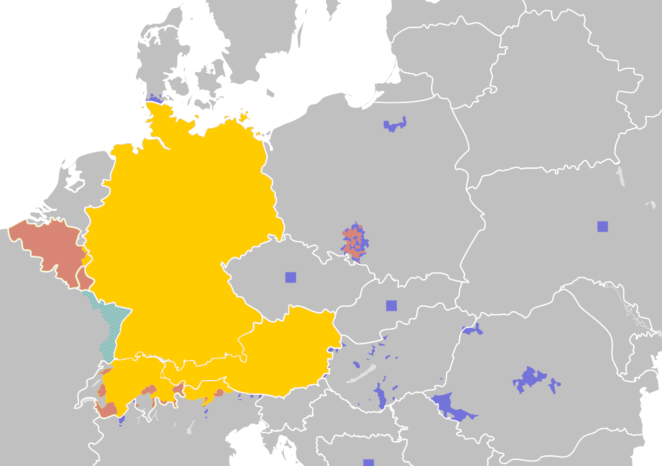German course - How important is German on the Swiss job market?
Although Switzerland has four national languages, it is German or Swiss German that is predominantly spoken by the majority of the Swiss population in everyday life and at work. In Switzerland as a whole, High German is regularly used by 68% of all employees at their workplace, while Swiss German is used by 60%, as shown in aSurveyof the Federal Statistical Office from 2014 on the subject of "Languages at work".
German course: there is a great desire for further training
It is therefore not surprising that an impressive 21.5% of all employees would like to learn German for their job in a German course or by other means, and 6.6% in German-speaking Switzerland. In the French and Italian-speaking regions, German is the most popular foreign language for the job market, with 42.8% in Ticino, far ahead of English at 24.2%, as this survey also shows. It may come as a bit of a surprise, however, that it is not even speaking German that is regularly required in the workplace, but above all the ability to read German, followed by written communication. However, this also shows how important it is, especially for non-native speakers, to take a professional German course in this language.
Wish or reality?
Even though so many people in Switzerland say they would like to learn German, does this correspond to their search behavior on the Internet? Are German courses actually being searched for in search engines? A look at the results clearly shows that they are. Both the search term "learn German" and the narrowly defined term "German course", with an average of up to 10,000 searches per month in Switzerland, prove that many people are not only toying with the idea of learning this language at some point, but are already searching specifically for possible offers. In the Zurich region in particular (up to 10,000 searches per month), but also in Winterthur, St. Gallen, Lucerne, Bern, Basel and Baden, up to 1,000 people per month are looking for suitable German courses.
Is German used in everyday working life everywhere in Switzerland?
Those who have learned German at school or in a German course clearly have an advantage on the Swiss labor market. In German-speaking Switzerland, 87% regularly need High German at work, 81% Swiss German, which is hardly surprising. However, learning German can also pay off in other language regions of Switzerland. As the above-mentioned FSO survey also found, 29% of all employees in the Italian-speaking region regularly use High German and 7.1% use a Swiss German dialect. As many as 16% or 4.6% of all people working in Valais regularly use High German or Swiss German, whereby regular in all cases means daily or at least once a week. A German course can therefore be a good investment for many francophone employees.
Good knowledge of German required
On any given day, we took a closer look at the job advertisements on a Swiss job portal and wanted to find out what language skills were actually required by employers. It was surprising to see that in addition to foreign language skills such as English and French, a large number of jobs explicitly required good to very good German language skills. This may not come as a surprise in a country where the majority of the population speaks German or Swiss German, but it also shows that many companies must receive applications from jobseekers who have little knowledge of German. Otherwise, the mention of language skills would be superfluous. German language skills were required in a total of 168 of the 270 job advertisements searched on this day, i.e. in well over half of the advertisements. This shows the importance of attending a German course.
Wanted across all sectors
A German course therefore seems to be well worthwhile when looking for a job and increases the chances of finding employment. And this is true across the board in all sectors, especially IT and telecommunications, purchasing / logistics / retail, sales / office work / customer service, but also mechanical / plant engineering / production, vehicles / trades / warehousing / transportation, finance / fiduciary / real estate, chemicals / pharmaceuticals / biotechnology, as well as security / police / customs / rescue. Such a small analysis, as conducted by us, cannot provide a representative result, but it shows how important German language skills seem to be on the Swiss labor market and how important it is to attend a German course.
Multilingualism an advantage
Anyone who has been able to improve their language skills thanks to a German course and is able to communicate well in German, both orally and in writing, will certainly find a job more quickly than someone who has no knowledge of German at all, at least in German-speaking Switzerland and under the same conditions. German language skills are a basic requirement almost everywhere in German-speaking Switzerland, but the national languages French and Italian are also very important on the Swiss job market, as is English. Multilingualism is therefore an advantage for employees. People who have a good to very good command of several languages usually earn more, not least because they can apply for better-paid jobs that require good foreign language skills.
German particularly worthwhile for French-speaking Swiss
For French-speaking Swiss, however, a German course can pay off particularly well. The LEAP study (Langues étrangères dans l'activité professionnelle) by the University of Geneva's Department of Economics, Languages and Education, published in 2009 and based on data from Professor François Grin of the University of Geneva, among others, shows that employees in French-speaking Switzerland who have a very good knowledge of German receive an average of 23% more pay than those who do not. Really good reasons to take a German course.

